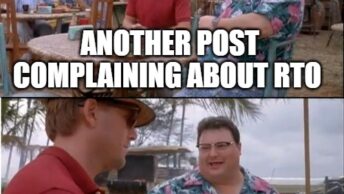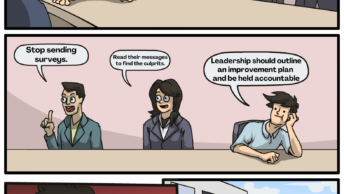We need to stop talking about the loss of writing jobs as a blow to the medium of writing. Instead encourage folks to pursue writing for themselves, focusing on originality and community.
“Writing is dead. I can not find work that pays well. Everyone wants to use AI.”
Posts sharing sentiments like these have become increasingly pervasive within social media communities, and it only hurts the medium of writing and those who pursue writing personally or professionally.
To start, go ahead and check the pulse of writing. Sit down, type on your keyboard, and watch what happens. Your thoughts become words. Messy or organized, it doesn’t matter.
While writing is not dead, the number of available writing jobs is declining. This decline primarily impacts marketing more than other industries. Journalism is a bit of a different and unfortunate story.
AI is another part of it, as is a changing SEO landscape. The third variable is harder to gauge but is likely influenced by a massive decline in funding, leading to less marketing spending overall.
So when people say that writing is dead, they mean that the type of writing jobs they previously worked are no longer available, which is unfair or does not consider my needs. The jobs they are speaking about typically fall into sales copy and SEO content.
While derivative SEO content and sales copy have their place, these areas hardly demand a high degree of specialty. That is why AI is replacing many jobs that were previously available to humans.
Folks in other industries will be impacted too, but the timeline and severity is arguable.
But for now it is largely those jobs with a low barrier of entry and high competitiveness are most at risk. Though for a long time things were very good to a lot of people.
But the good times had to end. The issue is that digital and the internet are so new and chaotic that those who fell into writing professionally on the internet have always been susceptible to even minor disruptions.
And there have been a lot of disruptions in recent years. Look at it from the following lens, from traditional print media to digital to AI:
- 1990s: Writers accept $1 per word and earn up to $1000+ for a 1,000+ word article featured in a printed periodical.
- 2000s: Digital writers accept $.20 per word and earn $200 for a 1,000-word article published on a website. Traditional writers scoff at how digital writers devalue writing by accepting five times less to do the same work.
- 2010s: Overseas writers found on Fiverr accept $.02 per word and earn $20 for a 1,000-word article published on a website. Digital writers scoff at how overseas writers devalue writing by accepting ten times less to do the same work.
- 2025: AI generates millions of words for $20 a month. Overseas writers scoff at how AI devalues writing and argues that companies need to hire human writers to do the same work.
If you go back far enough, you will find scribes who worked within the church to transcribe religious texts and scoffed at people using a printing press to mass-produce bibles.
With each technological leap, the number of people with access to writing tools and publishing platforms has grown tremendously. This is a good thing.
This brings us back to the introduction of this article. If there is a sudden decline in commercially available jobs, is that not bad? How can this be progress!?
For individuals, it is terrible.
For writing as a whole, it is good.
To be blunt, writing is miserable. Doing most types of artistic expression sucks. Many artists endure a lifetime of struggle, with most not publishing a written work or hanging a painting on a gallery wall.
Which is why we see many good writers (and some great writers) suckered into the death spiral of marketing – it pays better. What it does not do is move the needle for culture or journalism or originality.
This is not just about writers, either. AI is gradually affecting graphic design, visual animation, and music.
Again, the people disproportionately affected are those in heavily commercialized, churn-and-burn operations where AI better serves the business financially or where a low-skill barrier is easily overcome with derivative AI content.
We are in an odd place where writers are being put through a litmus test.
That litmus test goes like this: If you can not make money writing, will you still write?
I suspect many folks are dipping out in search of other lucrative opportunities. It’s likely because they never really cared for writing to begin with.
This is good because the internet and culture have become somewhat stagnant. A big part of this is the type of content incentivized by KPI-driven systems like Google, ad networks, and social media—largely derivative, devoid of originality, and written in a stale and broad voice.
Just look at what Netflix churns out. Not all of it is bad, but so much is planned, built, and released based wholly on KPIs. Good for investors, bad for culture.
If you identify as an artist, this should be a wake-up call to reevaluate your place in the creative space. You should also see this as an opportunity to find and work tirelessly towards your true calling, whether you earn something or nothing.
Yes, without writing jobs, you might be forced into a labor job or some other white-collar field. This will not feel good. But take it as a win for not having to give up your creative energy to commercial projects. Use your energies to invest in those things that serve your creative goals.
To offer an olive branch, a lot of people earned a living wage writing who may not find that other jobs pay enough to sustain their lifestyle. And worry over finances can affect creativity.
If there were a good solution, it would be published here. So, we go back to the litmus test.
That litmus test goes like this: If you can not make money writing and you have to work long hours doing something else, will you still find ways to write something… anything at all?
If the answer is that you will do anything to make it happen, then you are on a good path. Just think about how much writing you did for yourself when writing for commercial projects.
Even 100 words per day of writing what you want under the least desirable circumstances would be preferable to writing nothing under the most desirable circumstances.
Not that you can not or should not make money. If that happens, it will come organically from the community you build or people paying for your work.
This article has been harsh on the commercialisation of art. In the current state of things, we can not overlook that KPIs and playing to commercial markets are not entirely bad.
Would a play like Hamilton have succeeded if its creators had been unwilling to hold test screenings and tweak things to make it more saleable?
That is the balance you have to find, provided you never lose sight of why you want to write to begin with.
Is writing dead? I am writing this, so no. Anyone can write, and they should write. If you are dedicated, hardworking, and talented, you might find some competitive edge when applying to those few opportunities that pay generously, whether in finance, government, or journalism.
What about a few years back when there had been an abundance of well-paying jobs in marketing that almost anyone could land? Those are largely gone and will not come back, unless you are firmly cemented in a specialized niche and bring some unique perspective or have connections or sources that others do not. AI can generate most of the copy related to SEO and sales more efficiently than a human and at a lower cost. It sucks to hear, but we all need to hear it.
We must stop discussing the loss of writing jobs as a blow to writing. Instead, encourage folks to pursue writing for themselves, focusing on what they want to create while pushing boundaries of originality and growing a community.



